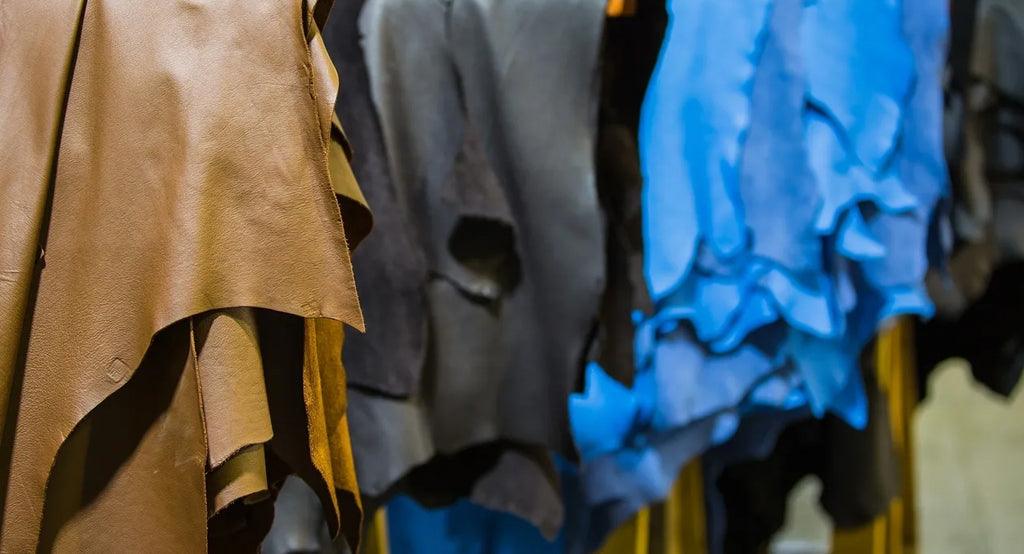
Can Leather Be Ethical?
Share
Being in the handbag business, I was curious to see what consumers were searching related to the category of handbags. A few weeks back I was Googling top trends in handbag searches and one search topic kept coming up - Can Leather Be Ethical?
Simply put, No! Here's Why.
When we speak of ethical production, these days it considers a wide variety fo things from:
- Worker's conditions
- The fairness of deals between producers, owners, sellers and re-sellers,
- The use of natural resources
- Impact on the community & the environment
It is an over arching approach to production.

Impact on Animals
Ethics considers how the animal has been raised, treated, fed and slaughtered.
Cows for example are slaughtered on average 18 months into their 20 year life expectancy.
The softest, most luxurious leather comes from the skin of newborn calves or even unborn calves, cut prematurely from the wombs of their mother's. It still surprises me how cruel we can be.
Now, you may own or want a leather handbag and it may contain a tag saying "Made in Italy" but, where did the skin come from?
The reality is that a large portion of the skins come from developing countries, namely India, Bangladesh & China where animal welfare and the ethical treatment of animals is on the bottom of the priority list, IF, it makes the list at all.
In PETA's video "Hell for Leather", it's documented the transport of cattle between India and Bangladesh where the cattle travel for hours and hours along dusty roads, abused and tortured along this journey only to finally reach their destination whereby in the back streets of Dhaka, the animals are skinned, in front of each other.
Needless to say, the abusive treatment of animals raised for leather has been well documented.

Environmental & Human Impact
Then, there's the environmental and human impact.
Let's start with the environmental impact.
Leather undergoes a tanning process so that the material is durable and less susceptible to decomposition - let's remember it is organic skin after all.
The highly toxic process of tanning leather uses poisonous chemicals - chemicals that have been banned in the EU and U.S. however, in developing countries, where you'll find many tanneries, the same regulations don't apply.
These poisons have seeped into the soil and water tables and have had disastrous and devastating environmental consequences.
The impact on people is equally devastating.
As most leather production happens in developing countries, most workers aren't protected by any safety or health regulations.
The skins are processed in tanneries with workers, including children, knee deep in toxic chemicals and of course without protective equipment.
Workers are paid a pittance for their work, they face severe health issues from constant exposure to the chemicals and child labour is very common.
Is leather a By-Product?
Now, you may be thinking leather is a by-product of the meat industry - well that's not entirely true. It is a Co-Product.
The leather industry generates an incredible amount of income - we're taking about billions of dollars a year. Animal skins are sold and made into leather goods for profit, not for waste reduction and as such, it is then a Co-Product not a by-product.
What about Vegetable Tanning?
Now, you may also be thinking, "What about vegetable tanned leather"? Well, that name isn't true. Vegetable tanning uses bark from trees, some of them 30 years old in the vegetable tanning process. Using the bark means stripping the tree of the bark and in so doing, it kills the tree contributing to environmental impacts.
So, because ethics takes into account all the factors I've discussed covering all aspects in the supply chain and because of the devastating impact it has to the environment, people and the animals - leather can never be ethical.
So what are the alternatives?
There are so many alternatives to leather these days that don't have a devastating impact on people, animals and the environment.
I'm proud to say, our brand, Karuna Dawn, offers bags in a variety of materials that don't involve the use of any animal products.
-
We have our beautiful and innovative Leaf Leather range
-
We have Organic cotton canvas tote bags
-
We have 100% up-cycled denim bags, stopping garments from going to landfill
Other brands are also offering animal leather alternatives and this is great to see. There's new, innovative plant-based leather made from pineapples, orange peels, mushrooms and there's also cork bags and many other solutions from which to choose.
What can you do?
When you're offered the luxury of choice, make the conscious and compassionate choice.
Research ethical, vegan & cruelty free brands. Support these brands that are offering compassionate choices and let's start moving away from cruel practices and vote with our wallets that send a message as consumers, that we want ethically and compassionately produced goods.
I'm not a proponent of perfection and you may own leather goods bought previously and that's ok but from today - let's make a commitment to bring awareness and compassion to the choices that we make and wherever possible, make the kind choice.
From today - just head in the direction of kindness. I've never gone wrong heading in that direction!








